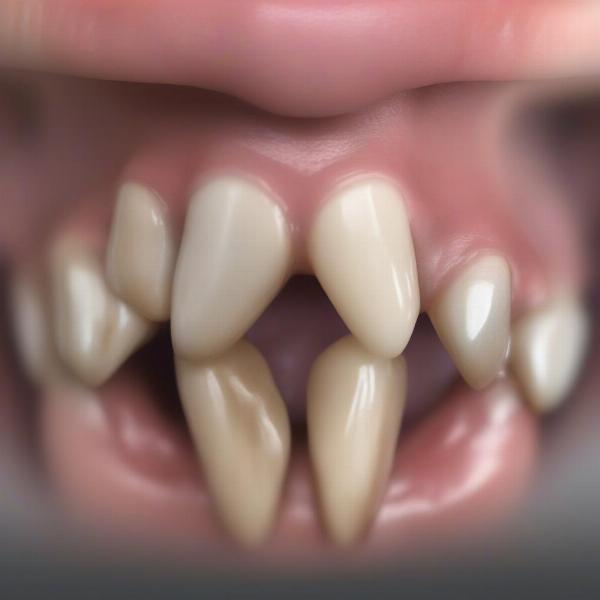A dead dog tooth, also known as a non-vital tooth, can be a serious health concern for your canine companion. Understanding the causes, symptoms, and treatment options for a dead tooth in dogs is crucial for ensuring their overall well-being. This article will provide you with the essential information you need to recognize and address this issue effectively.
Recognizing a Dead Dog Tooth
Identifying a dead tooth in dogs isn’t always straightforward. While some signs are obvious, others can be subtle. Discoloration, often a greyish or yellowish tint, is a common indicator.  Discoloration of a dog's dead tooth You might also notice swelling or inflammation around the affected tooth or gum line. Fractures or chips, particularly those exposing the pulp, can lead to tooth death. Finally, bad breath can sometimes be a sign of infection related to a dead tooth.
Discoloration of a dog's dead tooth You might also notice swelling or inflammation around the affected tooth or gum line. Fractures or chips, particularly those exposing the pulp, can lead to tooth death. Finally, bad breath can sometimes be a sign of infection related to a dead tooth.
Causes of Dead Teeth in Dogs
Trauma, such as a hard impact to the mouth, is a leading cause of dead teeth in dogs. Infections, if left untreated, can reach the tooth’s pulp and cause it to die. Dental diseases like periodontal disease can also compromise the tooth’s blood supply, leading to necrosis.
What to Do if You Suspect Your Dog Has a Dead Tooth
If you suspect your dog has a dead tooth, it’s crucial to seek veterinary attention immediately. Delaying treatment can lead to serious complications, including painful abscesses and bone infections. Your vet can diagnose the issue definitively and recommend the best course of action. head to tail dog grooming
Veterinary Diagnosis and Treatment Options
Your veterinarian will likely perform a thorough oral examination and may take X-rays to assess the extent of the damage. Treatment options typically include root canal therapy or extraction. dead dog tooth Root canal therapy involves removing the infected pulp and sealing the tooth to prevent further infection. Extraction is necessary when the tooth is severely damaged or if root canal therapy isn’t feasible.
“Early intervention is key when dealing with a dead tooth in dogs,” says Dr. Emily Carter, DVM. “The sooner the problem is addressed, the better the chances of preventing further complications and preserving your dog’s oral health.”
Preventing Dead Teeth in Dogs
Regular dental care plays a vital role in preventing dead teeth. Brushing your dog’s teeth daily with metal dog comb and providing appropriate chew toys can significantly reduce the risk of dental disease and trauma. Regular veterinary check-ups, including professional dental cleanings, are essential for maintaining optimal oral hygiene. dog stripping tool “Providing your dog with a healthy diet and avoiding sugary treats also contributes to good oral health,” adds Dr. Carter.
Conclusion
A dead tooth in dogs requires prompt veterinary attention. By understanding the causes, symptoms, and treatment options, you can ensure your furry friend receives the necessary care to maintain a healthy and happy smile. Regular dental care and routine veterinary check-ups are crucial for preventing dead teeth and preserving your dog’s overall well-being.
FAQ
- How can I tell if my dog has a dead tooth? Look for discoloration, swelling, fractures, and bad breath.
- What causes a dog’s tooth to die? Trauma, infections, and dental diseases are common causes.
- What should I do if I think my dog has a dead tooth? Contact your veterinarian immediately.
- What are the treatment options for a dead dog tooth? Root canal therapy or extraction.
- How can I prevent my dog from getting a dead tooth? Regular brushing, appropriate chew toys, and veterinary check-ups.
- Is a dead tooth painful for dogs? Yes, a dead tooth can be painful, especially if infected.
- Can a dead tooth cause other health problems in dogs? Yes, it can lead to abscesses and bone infections.
ILM Dog is your trusted resource for expert advice on dog care and well-being. We offer a wide range of information and services to help you provide the best possible care for your canine companion, from breed selection and health advice to training tips and product recommendations. From tlc dog grooming to dealing with a dead dog tooth, ILM Dog is here to support you every step of the way. For further assistance or to book a consultation, contact us at [email protected] or call us at +44 20-3965-8624.